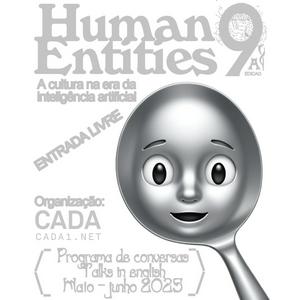Human Entities 2024: Monica Gagliano
Human Entities 2024: culture in the age of artificial intelligenceEighth edition, 15 May 2024
Plant consciousnessMonica GaglianoEvolutionary ecologist, Research Associate Professor (Adjunct) at Southern Cross University, Australia
Monica Gagliano PhD is an internationally award-winning research scientist, selected by Biohabitats as one of the 24 most Inspiring Women of Ecology, together with Jane Goodall, Rachel Carson, Sylvia Earl, and Terry Tempest Williams. She has been an invited lecturer at the most prestigious universities, including UC Berkeley, Stanford, Harvard, Dartmouth and Georgetown. Monica’s pioneering work has been widely featured by prominent media, such as The New York Times, Forbes, The New Yorker, The Guardian, National Geographic, and many others. Monica is Research Associate Professor (Adjunct) of evolutionary ecology based in Australia. She is currently Chief Scientist at Kaiāulu|Coherence Lab in Hawaii, and Research Associate at the Takiwasi Centre in Perú.
Monica has pioneered the brand-new research field of plant bioacoustics, which for the first time, experimentally demonstrates that plants emit voices and detect and respond to the sounds of their environments. Her work has extended the concept of cognition in plants. By demonstrating experimentally that learning and memory are not the exclusive province of animals, Monica has reignited the discourse of plant subjectivity, as well as ethical and legal standing. Inspired by encounters with nature and indigenous elders from around the world, Monica applies an innovative and holistic approach to science, one that is comfortable engaging at the interface between areas as diverse as ecology, physics, law, anthropology, philosophy, literature, music, the arts, and spirituality. By re-kindling a sense of wonder for the beautiful place we call home, she is helping to create a new ecology of mind that inspires the emergence of revolutionary solutions toward human interactions with the world we co-inhabit.
Monica’s studies have led her to author numerous ground-breaking scientific articles and books, including Thus Spoke the Plant (2018) and The Mind of Plants (2021).
https://www.monicagagliano.comhttps://www.instagram.com/_monicagagliano_https://en.wikipedia.org/wiki/Monica_Gaglianohttps://researchportal.scu.edu.au/esploro/profile/monica_gagliano/overview
CreditsOrganised by CADA in partnership with Lisbon Architecture Triennale and Faculty of Fine Arts, University of Lisbon
Programmed by Jared Hawkey/Sofia Oliveira with guest programmers: Andrea Pavoni, Justin Jaeckle, Lavínia Pereira and Olivia Bina.
Funded by: República Portuguesa – Cultura / Direção-Geral das ArtesSupport: Câmara Municipal de Lisboa; Universidade NOVA de Lisboa, Faculdade de Ciências e Tecnologia – NOVA LINCS; Instituto Ciências Sociais, Urban Transitions Hub, Universidade de Lisboa; DINAMIA’CET (ISCTE-IUL) and Faculdade Belas Artes, Universidade de Lisboa, Departamentos de Design de Comunicação e Arte MultimédiaDesign: Pedro LoureiroPhotography: Joana LindaSound: Diogo Melo
